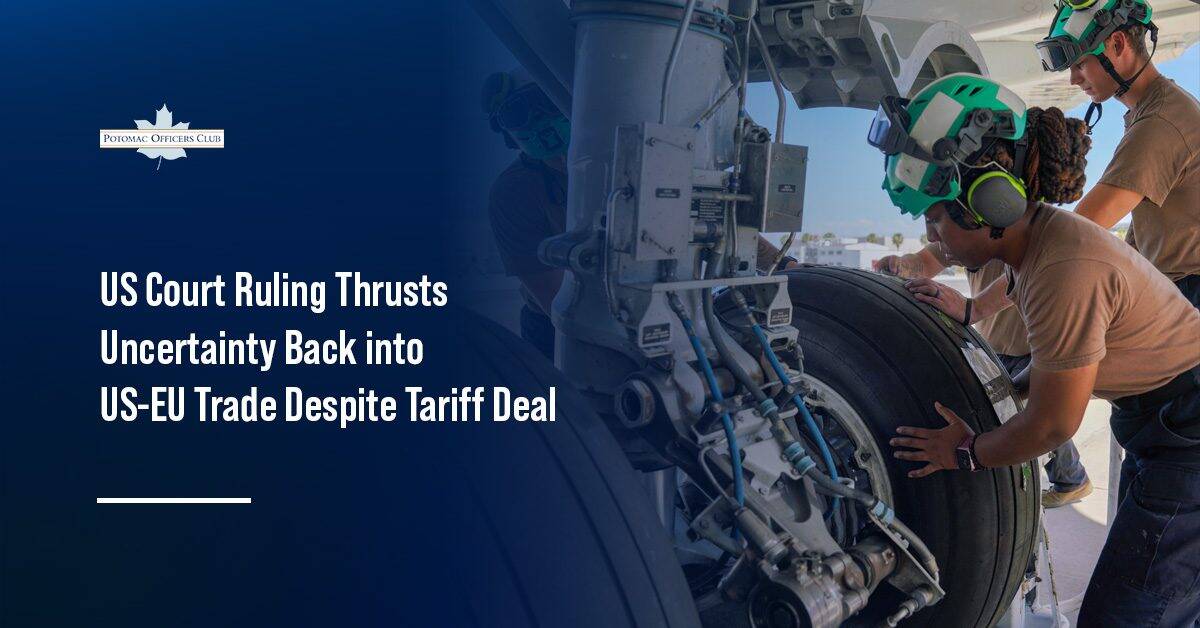
US Court Ruling Thrusts Uncertainty Back into US-EU Trade Despite Tariff Deal
A recent U.S. appeals court ruling has thrown uncertainty back into U.S.-EU trade relations despite a recent groundbreaking tariff deal between the world’s largest bilateral trade partners.
The U.S. might have to redo its trade deal with the EU if it loses a tariff case at the Supreme Court, President Donald Trump said on Wednesday in an article reported by Reuters. The White House will request the Supreme Court reverse a decision by a U.S. appeals court that found many of his tariffs were illegal.
The appeals court decision tackled the legality of what Trump deemed “reciprocal” tariffs first imposed as part of a trade disagreement in April. It also involved a different set of tariffs levied against Canada, Mexico and China in February. The decision does not affect tariffs issued as part of other legal authority, like those levied on aluminium and steel imports.
Keep abreast of the major GovCon stories every day via Executive Mosaic’s email newsletters! GovCon Wire covers major contract awards, mergers and acquisitions and financial updates from the sector’s leading companies. ExecutiveGov delivers key policy and contracting news straight from the federal government. ExecutiveBiz highlights updates from mid-tier businesses driving innovation. Stay informed and ahead of the curve with Executive Mosaic—Proudly Serving Those Who Serve the Mission.
What Is the US-EU Trade Deal?
The U.S.-EU trade deal levies 15-percent U.S. tariffs on most exports from the EU. As part of the agreement, the EU agreed to spend hundreds of billions of U.S. dollars on U.S. weapons and energy products, including a 15-percent tariff on many key EU exports, according to the Financial Times.
Other key provisions in the U.S.-EU trade deal includes a 15-percent tariff on EU exports of semiconductors to the U.S. Levies by the U.S. on steel and aluminum imports from the EU remain at 50 percent.
US-EU Trade Deal Impact on Aerospace
The U.S-EU trade deal has major ramifications for aerospace as it exempts aircraft from tariffs. While the 15-percent tariff rate applies to most EU products, it protects industries such as aerospace with “zero-for-zero” tariffs on aircraft and parts, Reuters reported in another article.
Aircraft, spare parts, engines and components from landing gear had faced higher costs and some aircraft deliveries faced disruption by potential U.S. tariffs as they would have caused supply chain disruptions. The Reuters article raised a question as to whether the aerospace provisions of the deal would apply to other sectors such as space.
The Financial Times cited a senior U.S. official saying it was “likely” that no further U.S. tariffs would be levied on EU aerospace exports to the U.S. once it concluded an investigation into the EU aerospace sector. The U.S. and EU performed $1.5 trillion in goods and services trade in 2024, up 5.7 percent from 2023, according to the Office of the U.S. Trade Representative.
Are you subscribed to our newsletters? Stay ahead of your GovCon competitors with exclusive updates from Executive Mosaic. Featuring significant contract awards and M&A news from GovCon Wire, important federal agency developments from ExecutiveGov and thorough industry insights from ExecutiveBiz. Obtain a complete understanding of GovCon, all provided by Executive Mosaic—Where We Connect Executives.

Category: Articles




